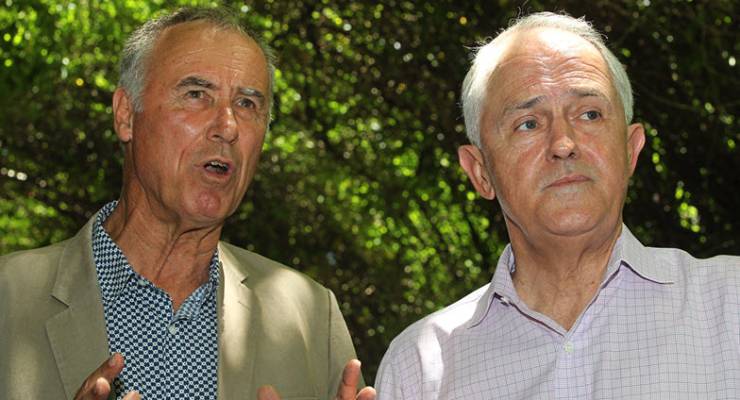
If you want an indication of how bad the Queensland result was for the federal Coalition, consider Malcolm Turnbull’s behaviour yesterday. Having finally made a much-delayed appearance in Bennelong, Turnbull accused Kristina Keneally of wanting to personally bring asylum seekers into the electorate and that her comments on the subject were being used by people smugglers in Indonesia to encourage the boats to start up again. And when asked about the fact that Antony Green had called the election for Annastacia Palaszczuk, the Prime Minister had a crack at the ABC. “How do all the other media organisations feel?” he asked. “Should they stop counting the votes now that the ABC has called it for the Labor Party?”
Um, Sky News called a Labor win at 9.40 the previous night, PM.
A fractious, rattled Turnbull, however, isn’t the Coalition’s major problem. The result in Queensland put on display the increasing tension between the mainstream, liberal wing of the Coalition, and a far-right fringe that is out of touch with 21st century Australia but which is large enough to cripple the conservative side. The reason it is so clear in Queensland is because just under a decade ago, the Nationals and the Liberals decided to merge there — something that many Nationals are now beginning to heartily regret. Somewhere, Mal Brough, who was ridiculed for his staunch opposition to the merger at the time, must be experiencing a few bucketloads of schadenfreude.
One Nation, yet again, underperformed electorally, managing less than 14% of the vote across the state. It’s become a pattern that when Hanson and her ilk are talked up and draw media scrutiny, they tend to flop; this is a party that performs best when left to lurk in the shadows. But 13.7% is more than one in eight voters and substantially higher than the Greens managed, and in a number of regional seats, One Nation scored above 30%. That so many people continue to think this party of scapegoating and smears is a solution to anything illustrates a depth of socio-economic disillusion that should trouble the entire governing class.
But this is also a deeply fractured electorate. A third of voters in some regional seats might have backed One Nation, but it is toxic for many voters in urban and suburban electorates and they want nothing to do with it. Twice now, in Western Australia and Queensland, conservatives have flirted with One Nation; in the west, via an actual deal, in Queensland, via the LNP refusing to rule out dealing with Hanson, and putting Labor last on its how-to-vote cards. Labor stuck to doing what it’s been doing for twenty years, putting the troglodytes last and ruling out dealing with them. Both times Labor has won. The message from ordinary, mainstream Australians (in, coincidentally, the two states where the government is in most trouble in terms of seats) is that dealing with One Nation is unacceptable. So what do conservatives do? The great majority of those One Nation votes are former conservative votes. Without them, the task of defeating Labor is significantly harder, especially when Labor manages to secure the great bulk of Greens votes via preference flows.
When the LNP was two parties, the task was easier. The Nationals could concentrate on regional and rural issues and give disgruntled voters a sense that, even if the Nats were aligned with the Liberals, they were still a specifically sectoral party. A merged party can’t do that. When the merger happened, moderate Liberals thought it was a Nationals takeover. But in electoral terms, it’s been a Liberal takeover, with many former Nationals voters clearly unhappy about the lack of what they think is a sectoral party for them.
So now some Nats are talking about de-merger, thinking that would enable them to differentiate their product from the Liberals. That might work to draw some One Nation votes back into the Coalition column. But what would it do to the Liberals? You see, the days of being able to speak to different audiences in different places have ended. What a politician says at a BBQ in a Townsville park no longer stays in Townsville; it’s reported on social media and within minutes, the Prime Minister is being asked whether he agrees. If you’re in a coalition with someone, you don’t have the luxury of distancing yourself from them when they start slagging off Muslims or LGBTI people.
Demerger or not, LNP members and senators at the federal level will now press ahead with differentiating themselves anyway, especially on banks. And avoiding placing the Prime Minister in a difficult position won’t exactly be a priority. Indeed, having a brawl with him might be just what some of them want. No wonder he’s cranky.








Crikey is committed to hosting lively discussions. Help us keep the conversation useful, interesting and welcoming. We aim to publish comments quickly in the interest of promoting robust conversation, but we’re a small team and we deploy filters to protect against legal risk. Occasionally your comment may be held up while we review, but we’re working as fast as we can to keep the conversation rolling.
The Crikey comment section is members-only content. Please subscribe to leave a comment.
The Crikey comment section is members-only content. Please login to leave a comment.